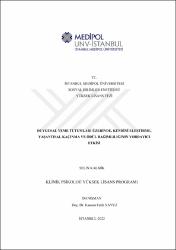| dc.contributor.advisor | Yavuz, Kaasım Fatih | |
| dc.contributor.author | Kalmik, Selin | |
| dc.date.accessioned | 2023-12-01T07:50:30Z | |
| dc.date.available | 2023-12-01T07:50:30Z | |
| dc.date.issued | 2022 | en_US |
| dc.date.submitted | 2022 | |
| dc.identifier.citation | Kalmik, S. (2022). Kendini eleştirme, yaşantısal kaçınma ve ödül bağımlılığının duygusal yeme tutumu üzerinde yordayıcı etkisi. (Yayımlanmamış yüksek lisans tezi). İstanbul Medipol Üniversitesi Sosyal Bilimler Enstitüsü, İstanbul. | en_US |
| dc.identifier.uri | https://tez.yok.gov.tr/UlusalTezMerkezi/tezSorguSonucYeni.jsp | |
| dc.identifier.uri | https://hdl.handle.net/20.500.12511/11914 | |
| dc.description.abstract | Bu çalışmada üniversite öğrencilerinde kendini eleştirme, yaşantısal kaçınma ve ödül bağımlılığının duygusal yeme tutumları ile ilişkisi ve duygusal yeme tutumlarının demografik değişkenlere (beden kitle indeksi, cinsiyet) göre farklılaşması incelenmiştir. Çalışma, her düzeyden 377 (264 kadın, 113 erkek), üniversite öğrencisinin katılımıyla yapılmıştır. Katılımcılara sırasıyla; araştırmacının hazırladığı sosyo-demografik form, 'Duygusal İştah Anketi (DİA)', 'Kabul ve Eylem Formu-II (KEF-II)', 'Davranışsal İnhibisyon/ Davranışsal Aktivasyon Sistemi Ölçeği (DİS/DAS)' ve 'Kendini Eleştirme/Kendine Saldırma Formları ve Kendine Güvence Verme Ölçeği (KEFGÖ)' verilmiştir. Elde edilen bulgular IBM SPSS 23.0 programı ile analiz edilmiştir. Verilerin analizinde bağımsız gruplar t-testi, ANOVA, pearson korelasyonu ve regresyon analizi kullanılmıştır. Elde edilen bulgulara göre; DİA olumsuz duygu, olumlu durum ve olumlu toplam alt boyutları cinsiyete göre anlamlı olarak farklılaşmıştır. DİA olumsuz durum ve olumsuz toplam alt boyutları BKİ değişkenine göre anlamlı olarak farklılaşmıştır. Korelasyon sonuçlarına göre; KEF-2 puanları ile DİA olumsuz duygu, olumsuz durum, olumsuz toplam alt boyutları arasında pozitif yönlü anlamlı bir ilişki, DİS/DAS ödüle duyarlılık alt boyutu ile DİA olumsuz duygu, olumlu duygu, olumlu durum ve olumlu toplam alt boyutları arasında negatif yönlü anlamlı bir ilişki, KEFGÖ yetersiz benlik alt boyut puanları ile DİA olumsuz duygu, olumlu durum, olumsuz durum ve olumsuz toplam alt boyutları arasında pozitif yönlü, DİA olumlu duygu alt boyutu arasında negatif yönlü anlamlı bir ilişki saptanmıştır. Regresyon sonuçlarına göre; KEF-II, KEFGÖ nefret eden benlik ve KEFGÖ rahatlatan benliğin DİA olumsuz toplamın anlamlı yordayıcıları olup, %6,7'sini açıkladığı görülmüştür. KEFGÖ rahatlatan benlik ve DİS/DAS ödüle duyarlılığın DİA olumlu toplamın anlamlı yordayıcıları olup %38,6'sını açıkladığı görülmüştür. Son olarak, DİA olumsuz toplam'ın BKİ'nin anlamlı yordayıcısı olup, %11'ini açıkladığı görülmüştür. | en_US |
| dc.description.abstract | In this study, the relations between self-criticism, experiential avoidance, reward dependence, emotional eating and differentiation of emotional eating scores among demographic variables (body mass index, gender) were explored. The study was conducted with 377 (264 women, 113 men) university students from all levels. The participants were given; socio-demographic form, 'Emotional Appetite Questionnaire (EAQ)', 'Acceptance and Action Questionnaire-2(AAQ-2)', 'Behavioral Inhibition Behavioral Activation Scale (BIS/BAS)' and 'Forms of Self- Criticizing and Self- Reassuring Scale (FSCRS)'. The findings obtained were analyzed with IBM SPSS 23.0 program. Independent groups t-test, ANOVA, pearson correlation and regression analysis were used to analyze the data. According to the findings, EAQ negative emotion, positive situation and positive total subscale scores differ significantly in terms of gender. EAQ negative situation and negative total subscale scores differ significantly in terms of BMI. According to the correlation results; there is a positive significant correlation between AAQ-2 scores and EAQ negative emotion, negative situation, negative total subscale scores, there is a negative significant correlation between BIS/BAS reward dependence subscale scores and EAQ negative emotion, positive emotion, positive situation and positive total subscale scores and there is a positive significant correlation between FSCRS inadequate self (IS) subscale scores and EAQ negative emotion, positive situation, negative situation and negative total subscale scores, a negative correlation between FCSRS- IS and EAQ positive emotion subscale scores. According to the regression results, AAQ-2, FSRS hated self (HS) subscale and FHRS reassuring self (RS) are significant predictors of EAQ negative total and explains 6,7% of the variable. FHRS- RS and BIS/BAS-RD are significant predictors of EAQ positive total and explains 38,6% of the variable. Lastly, EAQ negative total is a significant predictor of BMI and explains 11% of the variable. | en_US |
| dc.language.iso | tur | en_US |
| dc.publisher | İstanbul Medipol Üniversitesi, Sosyal Bilimler Enstitüsü | en_US |
| dc.rights | info:eu-repo/semantics/openAccess | en_US |
| dc.subject | Duygusal Yeme | en_US |
| dc.subject | Kendini Eleştirme | en_US |
| dc.subject | Ödül Bağımlılığı | en_US |
| dc.subject | Yaşantısal Kaçınma | en_US |
| dc.subject | Emotional Eating | en_US |
| dc.subject | Experiential Avoidance | en_US |
| dc.subject | Reward Dependence | en_US |
| dc.subject | Selfcriticism | en_US |
| dc.title | Kendini eleştirme, yaşantısal kaçınma ve ödül bağımlılığının duygusal yeme tutumu üzerinde yordayıcı etkisi | en_US |
| dc.title.alternative | The predictive effect of self criticism, experiential avoidance and reward dependence on emotional eating | en_US |
| dc.type | masterThesis | en_US |
| dc.department | İstanbul Medipol Üniversitesi, Sosyal Bilimler Enstitüsü, Klinik Psikoloji Ana Bilim Dalı | en_US |
| dc.relation.publicationcategory | Tez | en_US |
| dc.institutionauthor | Kalmik, Selin | |


















